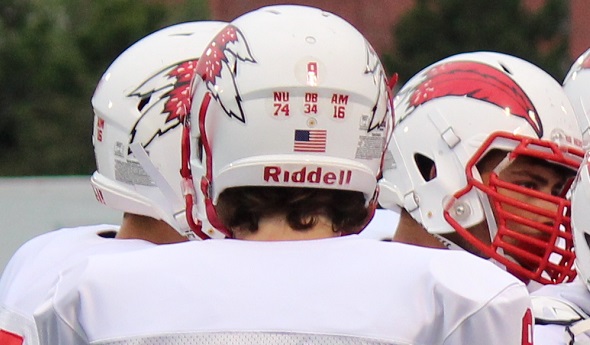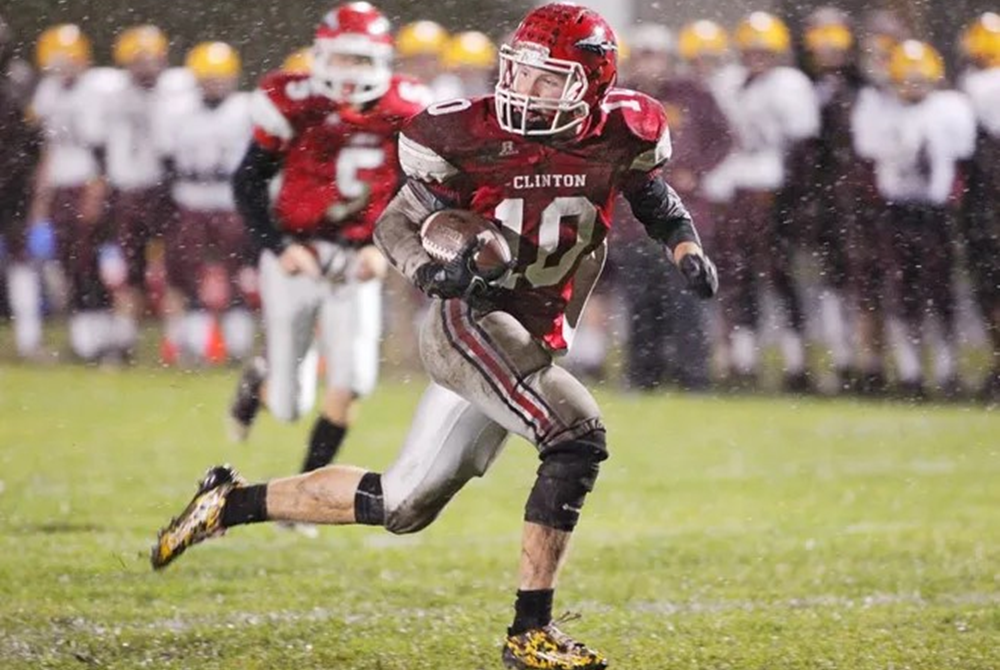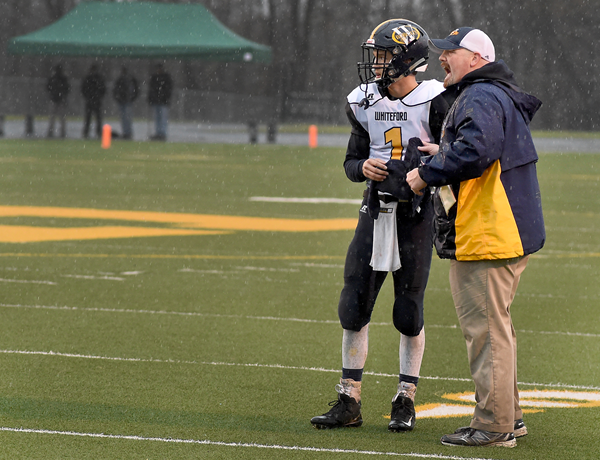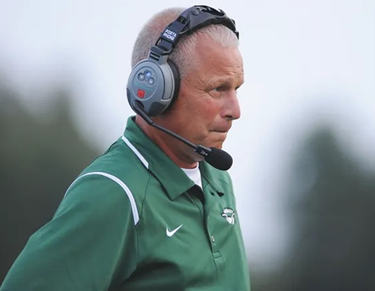
Football Teams Mourn, Regroup, Remember
By
Tom Markowski
Special for Second Half
September 2, 2015
CLINTON TOWNSHIP – A rash of deaths of high school football players in Macomb County and elsewhere in the Detroit area has shaken those communities and the football programs within them.
Three football players at Clinton Township Chippewa Valley have died in the past 16 months. This past May, two players from Sterling Heights Stevenson and one from Utica Ford died in a horrific automobile crash at Stoney Creek Metro Park. Another football player at Southfield High drowned in a swimming pool shortly before the start of practice last month.
 One player at Chippewa Valley died of cancer, another died from injuries suffered as the result of an accident that took place in a home and the third died Aug. 5, five days before the first official day of practice, in an all-terrain vehicle crash that took place in the northeast region of the Lower Peninsula.
One player at Chippewa Valley died of cancer, another died from injuries suffered as the result of an accident that took place in a home and the third died Aug. 5, five days before the first official day of practice, in an all-terrain vehicle crash that took place in the northeast region of the Lower Peninsula.
Chippewa Valley coach Scott Merchant played for coach Al Fracassa at Birmingham Brother Rice and then went on to play at Albion College before becoming a coach. Merchant remains shaken by the tragic events that have befallen his program.
In addition to the deaths of his players, two parents of former players, one only 46 years old, died during this time frame.
“They don’t give out manuals for this,” Merchant said. “It’s taken a lot out of me, personally. I don’t know. I’ve spent so much time away from my family, going to hospitals, going to funeral homes. You’re talking about young people’s lives here.
”I don’t know. I go to church. I believe in God. He has a plan. It’s hard to look a 16- or 17-year-old in their eyes and make sense of it all.”
Coaches coach, but there is so much more they are asked to do. They are expected to be mentors. They are often expected to be father figures. Sometimes they act as counselors, even if it isn’t in their job description. Perhaps most importantly they are leaders. They instruct their coaches and give them responsibilities. Players follow their directives and look to them for guidance.
On top of this, coaches are expected to be successful on the field. And a vast majority accept these responsibilities and a modest financial reward with a smile.
But when one of their players dies while still in high school, coaches must also remain emotionally strong for those who are too young to comprehend the finality.
Words of encouragement and a strong embrace can go a long way in times of trouble.
“We tell them, we’re here for you,” Merchant said. “We love you. We’re all hurting. We tell them there are two options. You can quit and be miserable. Or you can get off the ground and keep their memory alive.”
Nick Ureel was a senior at Chippewa Valley when he died of cancer in April 2014. Ureel played football his first two years but the cancer, which began in his testicles, prevented him from playing his junior and senior years.
Alex Mackmin was 16 years old when he died this May. He played on the junior varsity as a sophomore last season.
Merchant held workouts on Aug. 3 and 4 before letting his players go and enjoy the final few days before the start of practice Aug. 10. Duncan Blair, a senior who would compete for a starting position at linebacker, travelled north on vacation. He died while riding a four-wheel off-road vehicle that struck a tree.
 Coincidentally the Mackmin and Blair families attended the same church in Utica. Both funerals were held at that church.
Coincidentally the Mackmin and Blair families attended the same church in Utica. Both funerals were held at that church.
Blair’s parents rode the fan bus to Wayne State University for Chippewa Valley’s opener against Lake Orion. Rhys Blair runs the concession stand at Chippewa Valley.
The circumstances were much different for the players who died in the crash in early May in northern Macomb County – but it was no less tragic.
Jonathan Manolios and Emanuel Malaj from Stevenson and Michael Wells from Utica Ford were killed in a car crash. All three played varsity football as juniors in 2014. Two other high school students were injured in the crash and both survived. All five were 17 years old at the time of the crash.
Last season was Kevin Frederick’s first as head coach at Stevenson. He was the former head coach at Whittemore-Prescott.
Frederick had never dealt with anything like this before.
“It was devastating,” he said. “We had a meeting with the kids at school and discussed why it happened. There were grief counselors available. I did meet with some of the parents. Some reached out and said their son wasn’t handling it well.
“We warned our kids not to go on social media after. People forget (the students) were very young. There were some very unkind things said on social media. Alcohol was involved. Their mistake cost them their lives. We tell them to think before you get into a car. Think before you take a drink.
“Scott’s circumstances were different. Kids act in a way … it costs them dearly. Some walk away and grow. This time they didn’t walk away.”
Chippewa Valley and Stevenson are members of the Macomb Area Conference Red, and the teams will play Sept. 11 at Stevenson. Both coaches say they will do something to remember those who died.
Chippewa Valley opens its home season a week later against Warren Cousino. Merchant said his players will wear black jerseys instead of their traditional red to remember those who died.
“Football isn’t an escape,” Merchant said. “It’s a distraction. It takes your mind off of it, but it really doesn’t. We have pictures of all three (students) in our locker room. They are there to remind us.”
 Tom Markowski is a columnist and directs website coverage for the State Champs! Sports Network. He previously covered primarily high school sports for the The Detroit News from 1984-2014, focusing on the Detroit area but also contributing to statewide coverage of football and basketball. Contact him at [email protected] with story ideas for Oakland, Macomb and Wayne counties.
Tom Markowski is a columnist and directs website coverage for the State Champs! Sports Network. He previously covered primarily high school sports for the The Detroit News from 1984-2014, focusing on the Detroit area but also contributing to statewide coverage of football and basketball. Contact him at [email protected] with story ideas for Oakland, Macomb and Wayne counties.
PHOTOS: (Top) Chippewa Valley players are wearing the numbers of three deceased teammates on the backs of their helmets this season. (Middle) Coach Scott Merchant addresses his players after last week's win against Lake Orion at Wayne State University.

Tradition-Filled Tri-County Conference Kicking Off Final Season of 11-Player Football
By
Doug Donnelly
Special for MHSAA.com
August 20, 2024
The bus driver went too fast.
 It was fall of 1979, and Ottawa Lake Whiteford football coach John Hoover had come up with a plan for his Bobcats to dress in their own locker room, warm up on their own field and arrive at the Petersburg Summerfield football field for a Tri-County Conference battle just moments before kickoff.
It was fall of 1979, and Ottawa Lake Whiteford football coach John Hoover had come up with a plan for his Bobcats to dress in their own locker room, warm up on their own field and arrive at the Petersburg Summerfield football field for a Tri-County Conference battle just moments before kickoff.
The plan was working, except the bus driver went a little too fast.
“I don’t remember when I decided we would do it,” Hoover said. “But the night before our game, I got in my car, and I drove about the speed that I thought the bus driver would take from Whiteford to Summerfield. I had a stopwatch to time it just right. I didn’t tell anybody.”
The ploy was meant to rattle the opponent, perhaps make the other team lose focus on the game at hand.
“It’s only like 20 minutes between schools, so warming up at Whiteford and driving was no different than warming up at Summerfield and walking out to the field and waiting through the national anthem and the coin toss,” Hoover thought.
The scheme was working to perfection, but when Hoover determined the arrival would be too soon, he had the bus driver pull over just outside of Petersburg. Finally, the bus made its final trek and arrived.
On the first play from scrimmage, Summerfield fumbled, Whiteford recovered and scored a few plays later – the only touchdown of the game in a 7-0 Bobcats win.
 “I don’t know if it worked,” Hoover said. “But, when the bus got near, when we were driving up the road where the Summerfield stadium was, the head coach (LeRoy Wood) was out in the middle of the street, looking down the road, looking for us. I knew right then that it probably worked. It wouldn’t have worked if we had cell phones like they do today.”
“I don’t know if it worked,” Hoover said. “But, when the bus got near, when we were driving up the road where the Summerfield stadium was, the head coach (LeRoy Wood) was out in the middle of the street, looking down the road, looking for us. I knew right then that it probably worked. It wouldn’t have worked if we had cell phones like they do today.”
Summerfield and Whiteford have played some spirited games over the years as rivals in the Tri-County Conference. Unfortunately, the season that starts next week will be the last one for 11-player football in the TCC.
With the makeup of the league changing over the last decade or so and the move to 8-player football for three league schools, this is the final season for TCC football after 51 years of small-town competition.
The league has just three remaining schools playing 11-player football – Whiteford, Summerfield and Erie Mason. There is no TCC football schedule for 2025 and beyond, although the league itself will stay together for other sports.
“The 2024 season will be the last season that a TCC football champion is recognized in the current league format for football,” Britton Deerfield athletic director Erik Johnson said.
It will be the end of an era in southeast Michigan.
The league was formed in 1973 with schools from Washtenaw, Lenawee and Monroe Counties.
Several schools have taken turns at the top of the conference. Sand Creek has the most league championships, winning 15 between 1977 and 2011 – 14 of them under head coach Ernie Ayers. Morenci (9), Whiteford (7), Summerfield (7) and Clinton (7) have hoisted their fair share of league football trophies. Ayers is the winningest coach in league history, going 174-71 in league games over 38 seasons. Sand Creek left the TCC in football only after last season and will compete in the Big 8 Conference this season.
Whiteford is the only league school to win an MHSAA Finals football championship, but Sand Creek, Morenci and Clinton all have appeared in state championship games.
Both times Clinton played in Finals, Mathew Sexton was the star. Sexton would go on to play four years at Eastern Michigan University and has been in multiple NFL training camps and played in the XFL. He’s the league record holder for touchdowns and points scored.
 “I loved being in the TCC,” Sexton said. “It was great competition and was always a blast. Played with some great players, coaches and love the atmosphere each game would bring. Clinton and the TCC made me who I am today. I’m thankful for the experience it gave me.”
“I loved being in the TCC,” Sexton said. “It was great competition and was always a blast. Played with some great players, coaches and love the atmosphere each game would bring. Clinton and the TCC made me who I am today. I’m thankful for the experience it gave me.”
Summerfield graduate Jamie LaRocca was an all-state running back in the league, coached in the league and later watched his sons play football in the league as student-athletes at Whiteford.
“There were some great games, great battles,” LaRocca said. “Most of all, it was competitive. Sand Creek was good, Summerfield had good teams and Morenci had some great teams. Different teams always seemed to make their run.”
Britton and Deerfield were two charter members of the TCC, along with Ann Arbor St. Thomas (now known as Ann Arbor Father Gabriel Richard), Summerfield and Adrian Madison. During the 1990s, however, Britton and Deerfield formed a co-op and became Britton-Deerfield. They later officially combined high schools to become Britton Deerfield
BD had a dominating run on the football field in the late 1990s and early 2000s. Among the players who played for BD teams were Dan Musielewicz and Dustin Beurer. Beurer is now the head coach at Division II Northwood University while Musielewicz is head coach at Division III University of Olivet.
Beurer said he remembers as a high school student going to class with others from rivals Sand Creek or Madison at the Lenawee County Vocational Tech school all week, then playing against them on Friday nights.
“I get goosebumps thinking about those days,” he said. “It was small-town football at its finest back in the day.”
Brad Maska, now the head boys basketball coach at Onsted, was the BD quarterback when that team won multiple TCC titles.
“It is sad,” Maska said of the end of the TCC football era. “It truly was a great conference that produced a lot of great teams, coaches, and players throughout the years.
“The best part of the conference was the small-school pride from the communities. Friday night playing at Sand Creek or Whiteford when I was in school was always the only thing going on in town and the communities always got around us, and the atmosphere for small-school football was amazing.”
 Doug Donnelly has served as a sports and news reporter and city editor over 25 years, writing for the Daily Chief-Union in Upper Sandusky, Ohio from 1992-1995, the Monroe Evening News from 1995-2012 and the Adrian Daily Telegram since 2013. He's also written a book on high school basketball in Monroe County and compiles record books for various schools in southeast Michigan. E-mail him at [email protected] with story ideas for Jackson, Washtenaw, Hillsdale, Lenawee and Monroe counties.
Doug Donnelly has served as a sports and news reporter and city editor over 25 years, writing for the Daily Chief-Union in Upper Sandusky, Ohio from 1992-1995, the Monroe Evening News from 1995-2012 and the Adrian Daily Telegram since 2013. He's also written a book on high school basketball in Monroe County and compiles record books for various schools in southeast Michigan. E-mail him at [email protected] with story ideas for Jackson, Washtenaw, Hillsdale, Lenawee and Monroe counties.
PHOTOS (Top) Clinton’s Mathew Sexton scored more touchdowns in Tri-County Conference games than any player in league history. (Middle) Thomas Eitniear was the quarterback and Jason Mensing head coach at Whiteford when the Bobcats became the first school in Tri-County Conference history to win an MHSAA Finals football championship. (Below) Ernie Ayers coached at Sand Creek for 38 years and won 14 Tri-County Conference championships. (Photos courtesy of the Adrian Daily Telegram and Monroe News.)

